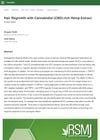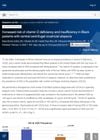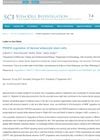October 2004 in “Veterinary dermatology” Veterinary Dermatology improved its impact and ranking, expanded content, planned online submissions, and emphasized the need for better-designed clinical trials.
 July 2019 in “Dermatología Cosmética, Médica y Quirúrgica”
July 2019 in “Dermatología Cosmética, Médica y Quirúrgica” Small injections of dutasteride improved hair thickness in men with hair loss without major side effects.
 1 citations,
October 2022 in “Annals of Translational Medicine”
1 citations,
October 2022 in “Annals of Translational Medicine” Cucurbitacin helps mice grow hair by blocking a protein that stops hair growth.
 13 citations,
April 2018 in “Journal of The American Academy of Dermatology”
13 citations,
April 2018 in “Journal of The American Academy of Dermatology” People with certain types of hair loss, especially lichen planopilaris and telogen effluvium, as well as African Americans, Asians, and men, are more likely to have severe vitamin D deficiency.
 9 citations,
July 2021 in “Frontiers in Pharmacology”
9 citations,
July 2021 in “Frontiers in Pharmacology” Cholesterol-modified siRNAs targeting certain genes increased hair growth in mice.

Certain drugs can worsen hair loss in people prone to androgenetic alopecia.
75 citations,
September 2007 in “Journal of Heredity” FGF5 gene mutations cause long hair in domestic cats.
29 citations,
February 2011 in “PloS one” Astressin-B can reverse and prevent hair loss in stressed mice.
20 citations,
August 2007 in “Molecular therapy” Applying a DNA vaccine to skin with active hair growth boosts immune response and protection against anthrax in mice.
 7 citations,
April 2021 in “Cannabis”
7 citations,
April 2021 in “Cannabis” CBD-rich hemp oil can significantly increase hair regrowth in people with common hair loss, with no reported side effects.
 3 citations,
February 2022 in “Journal of the American Academy of Dermatology”
3 citations,
February 2022 in “Journal of the American Academy of Dermatology” Black patients with a specific type of hair loss have a much higher chance of lacking enough vitamin D.
 3 citations,
September 2021 in “Journal of Food Science and Nutrition”
3 citations,
September 2021 in “Journal of Food Science and Nutrition” Red Ginseng Extract helps hair grow and improves skin health by stimulating cell growth and enhancing the body's antioxidant defense system.
1 citations,
July 2021 in “Hair transplant forum international” Daily use of CBD-rich hemp oil significantly increased hair growth in people with hair loss.
 1 citations,
January 2019 in “Turk Dermatoloji Dergisi”
1 citations,
January 2019 in “Turk Dermatoloji Dergisi” Oxidative stress is likely important in causing telogen effluvium, and antioxidants might help treat it.
 May 2024 in “Chemical engineering journal”
May 2024 in “Chemical engineering journal” New treatment using Minoxidil and EGCG with ionic liquids improves hair growth and quality for hair loss.
The serum is safe and effective for treating hair loss.
 February 2023 in “Archives of Dermatological Research”
February 2023 in “Archives of Dermatological Research” Laser treatment, especially when combined with other therapies, is effective for hair regrowth in alopecia areata.
 January 2021 in “Turkiye Klinikleri Journal of Dermatology”
January 2021 in “Turkiye Klinikleri Journal of Dermatology” Many young men with hair loss have low levels of vitamin D and B12.
Dr. SKS Hair Booster Serum is safe and effective for reducing hair fall and promoting hair growth.
 3 citations,
September 2017 in “Stem cell investigation”
3 citations,
September 2017 in “Stem cell investigation” PDGF signaling is crucial for maintaining fat stem cells in the skin, and its level of activation can either preserve these cells or cause fibrosis.
 2 citations,
July 2022 in “Frontiers in Medicine”
2 citations,
July 2022 in “Frontiers in Medicine” The cause of Frontal fibrosing alopecia, a type of hair loss, is complex, likely involving immune responses and genetics, but is not fully understood.
 1 citations,
October 2021 in “Clinical, Cosmetic and Investigational Dermatology”
1 citations,
October 2021 in “Clinical, Cosmetic and Investigational Dermatology” Vitamin B3 may help prevent hair loss and promote hair growth by protecting scalp cells from stress and reducing hair growth-blocking proteins.
 July 2024 in “Clinical Cosmetic and Investigational Dermatology”
July 2024 in “Clinical Cosmetic and Investigational Dermatology” Non-drug therapies show promise for hair regrowth but need more research.
 September 2023 in “Medicine”
September 2023 in “Medicine” The research suggests immune system changes and specific gene expression may contribute to male hair loss, proposing potential new treatments.
221 citations,
July 2012 in “Proceedings of the National Academy of Sciences of the United States of America” BMAL1 controls skin cell growth and UV damage risk, peaking at night.
54 citations,
December 2011 in “American Journal Of Pathology” A Gsdma3 mutation causes hair loss due to stem cell damage from skin inflammation.
 23 citations,
June 1976 in “PubMed”
23 citations,
June 1976 in “PubMed” Crash dieting can cause temporary hair loss due to not getting enough energy for hair growth.
20 citations,
February 2018 in “Cell transplantation” Cinnamomum osmophloeum leaf extract may help treat hair loss by promoting hair growth and increasing hair cell proliferation.
10 citations,
November 2008 in “Veterinary Dermatology” The mouse hairy ears mutation causes longer ear hair due to changes in gene expression.
 7 citations,
May 2022 in “PLOS ONE”
7 citations,
May 2022 in “PLOS ONE” Certain genes and pathways are linked to the production of finer and denser wool in Hetian sheep.


















